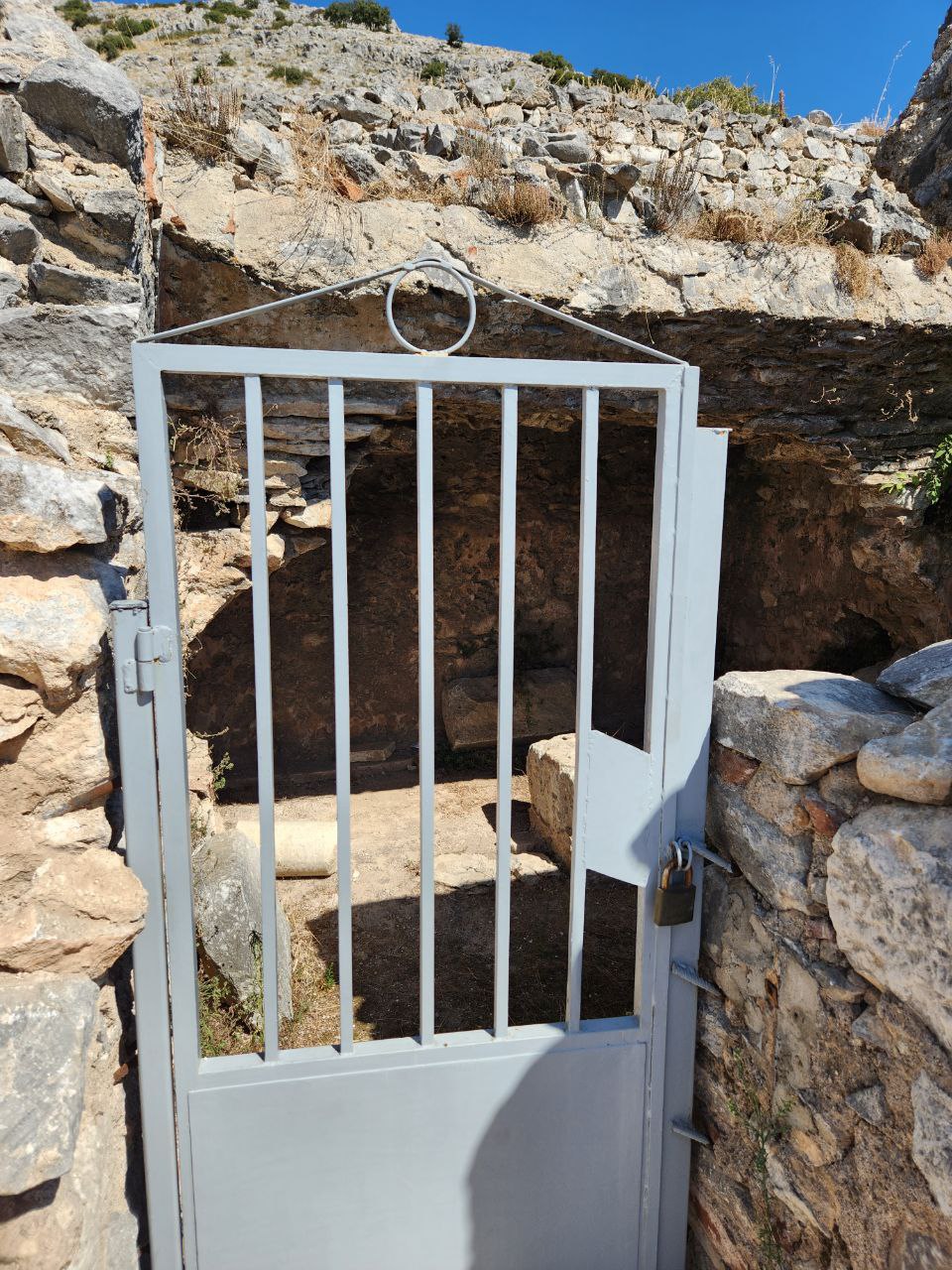The Nephilim agenda creates a revolving door of societal trauma. 2024 has started with a bang – a 7.5 earthquake in Japan, the release of the Epstein documents, and reports of 8–10-foot Nephilim appearing at the Miami Bayside Mall. If this is any indication of what this year will be like, we must ask ourselves, what or who is the source of our peace?
Paul wrote in Philippians 4:12 “I know what it is to be in need, and I know what it is to have plenty. I have learned the secret of being content in any and every situation, whether well fed or hungry, whether living in plenty or in want.”
This declaration is powerful, especially when we consider the context. Paul was brutally beaten in Philippi; his ability to find contentment in any and every situation was quite remarkable. When Paul arrived in Philippi, he looked for those who were worshipers of God. At the time, there were not enough Jews in Philippi to construct a synagogue, so the worshipers gathered by the river.

River in Philippi. Photo taken by Laura Sanger, Ph.D.
Down by the river, Paul shared the gospel message with a group of people including Lydia, a successful businesswoman involved in trading purple cloth. She received Paul’s message and became a follower of Christ. Lydia was the first Western woman to be baptized by Paul. I imagine Paul was greatly encouraged by her conversion. True to form, the enemy mounted an immediate attack.
A few days later, a slave girl who told the future, began harassing Paul. She followed him saying “these men are servants of the Most High God, who are telling you the way to be saved” (Acts 16:18). She was not lying, she was speaking the truth, but in a mocking, irritating way. She kept this up for a few days until Paul became frustrated and rebuked the spirit. When he cast the spirit out of her, she could no longer tell the future. Her masters were enraged so they stirred up the crowd. They seized Paul and Silas and dragged them to the marketplace to face the authorities. The Roman magistrates ordered them to be stripped naked and flogged. Let’s pause here for a moment…
Imagine yourself being in a crowded farmer’s market and being stripped naked. That alone is more than I would ever want to experience. But being stripped naked was just the start of Paul and Silas’ very bad day. They were then beaten with rods. Some scholars believe these were metal rods and others say they were made of birchwood. We know from history that the Romans trained their strongest men to exact the most pain from these beatings; they were merciless. Acts 16:23 emphasizes that Paul and Silas were severely flogged. We do not know how many lashes they received given the Romans did not adhere to the Mosaic law (40 lashes minus one). Many victims died because of the Roman beatings because they were skilled in the dark arts of inflicting great torture.
The Romans used several methods of corporal punishment with rods. One form of torture involved tying the arms of the victim behind their back to restrict their movement, like a straightjacket. While the victim was lying on the ground, their legs were raised so that their feet were beaten until they were bloody, maimed, and broken. Often, this form of flogging crippled the person for life. For Paul, this could have ended his apostolic work. The other form of torture was blunt strikes with the rod to the entire body; most often this proved fatal. We are unsure which form of beating Paul and Silas received that day, but we can be certain it was brutal. They were likely near death.
As if that were not bad enough, Paul and Silas were then thrown into prison. They were ordered into maximum security with their feet placed in stocks. Take a moment to picture this by looking at the photos of the prison cell. You and I think we have bad days, but nothing compares to what Paul and Silas went through that day. How did they respond?


Paul and Silas Prison cell in Philippi. Photo taken by Laura Sanger, Ph.D.
At midnight, when most people would have passed out from sheer exhaustion and pain, Paul and Silas were praying, praising, and singing worship songs to God. I am so deeply challenged by this, especially because it is so easy for me to complain. How were Paul and Silas capable of praising God after all they went through?
The torture Paul experienced in Philippi was not isolated.
2 Corinthians 11:24-27 “Five times I received from the Jews the forty lashes minus one. Three times I was beaten with rods, once I was pelted with stones, three times I was shipwrecked, I spent a night and a day in the open sea, I have been constantly on the move. I have been in danger from rivers, in danger from bandits, in danger from my fellow Jews, in danger from Gentiles, in danger in the city, in danger in the country, in danger at sea; and in danger from false believers. I have labored and toiled and have often gone without sleep; I have known hunger and thirst and have often gone without food; I have been cold and naked.”
Of all people, Paul deserved to complain about his life. Nevertheless, he learned the secret of being content in any situation. Where did he acquire this type of resilience? We are given a clue in 2 Corinthians 12.
2 Corinthians 12:7-10 “Even though I have received such wonderful revelations from God. So to keep me from becoming proud, I was given a thorn in my flesh, a messenger from Satan to torment me and keep me from becoming proud. Three different times I begged the Lord to take it away. Each time he said, “My grace is all you need. My power works best in weakness.” So now I am glad to boast about my weaknesses so that the power of Christ can work through me. That’s why I take pleasure in my weaknesses, and in the insults, hardships, persecutions, and troubles that I suffer for Christ. For when I am weak, then I am strong.”
Paul’s resilience was otherworldly, it did not originate within himself. His resilience came from the strength found in the Lord. Paul understood that when we are weak, it allows the Lord to demonstrate his power and strength at work through us. Paul was able to face extreme persecution without fear because he knew Jesus would give him the strength to endure.
As we face uncertainty about what this year holds, we must resist living in fear. I think one of the greatest tragedies of the planedemic was people became incapacitated by fear. Not only does prolonged fear weaken our immune system, but it pulls us down to that lower frequency range where the battle is raging. Our creator understands this and warns us 52 times in the Old Testament alone to fear not.
2 Timothy 1:7 “For God has not given us a spirit of fear, but of power and of love and of a sound mind.”
When Paul wrote this encouragement to Timothy, it was during a time of extreme persecution under Roman Emperor Nero. Timothy was leading the church in Ephesus and he knew that at any time, Nero’s secret police could capture him which would lead to barbaric torture. A spirit of fear tried to overcome Timothy, Paul discerned this and so admonished Timothy to resist giving in to fear.
The phrase ‘sound mind’, in 2 Timothy 1:7, is a Greek compound word made from the words ‘sodzo’ and ‘phroneo’. ‘Sodzo’ means “to be saved or delivered.” It implies that someone has been rescued, revived, delivered, salvaged, and/or protected. It could mean rescuing someone from the verge of death by breathing new life into them. ‘Phroneo’ means intelligence, the total frame of thinking which includes rationale, logic, and emotion. It refers to every part of the human mind. When these two words are compounded together, it means a “mind that has been delivered, rescued, revived, salvaged and protected; a mind that is now safe and secure.” (1)
Rick Renner writes in Sparkling Gems from the Greek, “When your mind is guarded by the Word of God, you think differently. When the Word of God is allowed to work in your mind, it safeguards your emotions; it defends your mind from demonic assault; and it shields you from arrows the enemy may try to shoot in your direction in order to arouse a spirit of fear inside you.” (2)
There is no need to fear when we realize the hope we have in Jesus!
Hebrews 6:18-19 (The Message) “We who have run for our very lives to God have every reason to grab the promised hope with both hands and never let go. It’s an unbreakable spiritual lifeline, reaching past all appearances right to the very presence of God.”
When we surrender our lives to Jesus, the Holy Spirit indwells us; the Presence of God lives inside of us. We would be fools not to tap into this incredible power source! But so often we do not draw upon the deep wells of the Lord’s strength inside of us because we are too distracted by our emotions and our circumstances.
John Eldredge says “Like a tree sends its roots down deep into the subterranean world, we must learn to tap into the presence of God where he resides within us, deep in our inmost being.” (3)
The Lord looks to strengthen those who are fully committed to him.
2 Chronicles 16:9 (NLT) “The eyes of the Lord search the whole earth in order to strengthen those whose hearts are fully committed.”
If we have prioritized our relationship with Jesus, then when crisis hits, we can draw upon the resilience He provides us. We endure the trials because we know they sharpen our character and build maturity within us. We have the privilege to be counted as part of the remnant in the last days. We were born for such a time as this!! May we rise up in the strength of the Lord to fight against the spiritual forces of wickedness and lay hold of the victory Christ already secured for us on the cross.
Written by Laura Sanger, Ph.D.
References
- Renner, R. (2003). Sparkling Gems from the Greek, Volume 1. Tulsa, OK: Harrison House.
- Ibid.
- Eldridge, J. (2022). Resilient. Nashville, TN: Nelson Books.

